

Argive. [ ahr-jahyv, -gahyv ] / ˈɑr dʒaɪv, -gaɪv / adjective noun a native of Argos. a Greek.

Origin of Argive 1590–1600; < Latin Argīvus < Greek Argeîos of Argos Dictionary.com Unabridged Based on the Random House Unabridged Dictionary, © Random House, Inc. 2020. Olenus.
Io. Io, IO, iO, I/O, i/o, or i.o. may refer to: In arts and media[edit] Fictional elements[edit] Scylla Io, one of Poseidon's Marine Generals in the Saint Seiya seriesInternational Operations, a fictional American Intelligence Agency in Wildstorm comicsA Dungeons & Dragons dragon deityIo Otonashi, a main character in the Japanese manga series Place to Place (Acchi Kocchi) Gaming[edit] iO, a 2014 video game by GamiousIO Interactive, a Danish computer game developer.

Europa. From Wikipedia, the free encyclopedia Jump to navigationJump to search Europa may refer to: Places[edit]
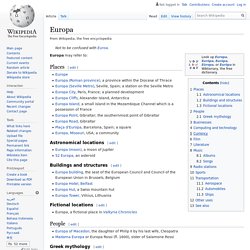
Medea. She aids Jason in his search for the Golden Fleece out of love, assisting him with her magic and saving his life in several quests, playing the role of an archetypal helper-maiden, before abandoning her native Colchis, marrying him, and fleeing with him westwards where they eventually settle in Corinth.
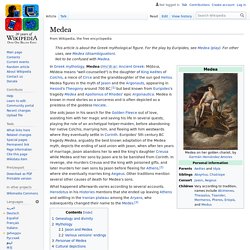
Euripides' 5th century BC tragedy Medea, arguably the best known adaptation of the Medea myth, depicts the ending of said union with Jason, when after ten years of marriage, Jason abandons her to wed the king's daughter Creusa while Medea and her sons by Jason are to be banished from Corinth. In revenge, she murders Creusa and the king with poisoned gifts, and later murders her own sons by Jason before fleeing for Athens,[2] where she eventually marries king Aegeus. Other traditions mention several other causes of death for Medea's sons. Genealogy and divinity[edit] The importance of Medea's genealogy is to help define what level of divinity she possessed.
Paris. Capital of France Place in Île-de-France, France Paris (French pronunciation: [paʁi] (
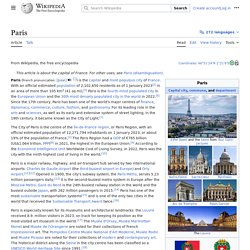
Helen of Troy. Daughter of Zeus in Greek Mythology Elements of her putative biography come from classical authors such as Aristophanes, Cicero, Euripides, and Homer (in both the Iliad and the Odyssey).
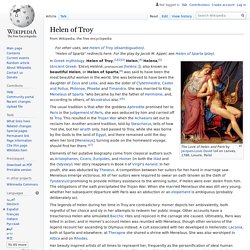
Her story reappears in Book II of Virgil's Aeneid. In her youth, she was abducted by Theseus. A competition between her suitors for her hand in marriage saw Menelaus emerge victorious. All of her suitors were required to swear an oath (known as the Oath of Tyndareus) promising to provide military assistance to the winning suitor, if Helen were ever stolen from him. Trojan War.
Mythological war Whether there is any historical reality behind the Trojan War remains an open question.
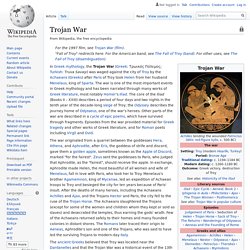
Many scholars believe that there is a historical core to the tale, though this may simply mean that the Homeric stories are a fusion of various tales of sieges and expeditions by Mycenaean Greeks during the Bronze Age. Colchis. Historical region of Antiquity Internationally, Colchis is perhaps best known for its role in Greek mythology, most notably as the destination of the Argonauts, as well as the home to Medea and the Golden fleece.[3] It was also described as a land rich with gold, iron, timber and honey that would export its resources mostly to ancient Hellenic City states.[4] Geography and toponyms[edit] Colchian scent bottle fourth century BC Colchís, Kolkhís[7][8][9][10] or Qulḫa[11][12][13] which existed from the c. 13th to the 1st centuries BC is regarded as an early ethnically Georgian polity;[by whom?
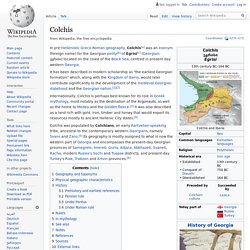
Colchis. Medea. Lydia. Old Age kingdom of western Asia Minor Lydian Empire circa 600 BC.
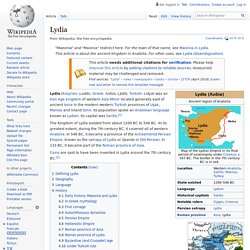
Lydia (Assyrian: Luddu; Greek: Λυδία, Lȳdíā; Turkish: Lidya) was an Iron Age kingdom of western Asia Minor located generally east of ancient Ionia in the modern western Turkish provinces of Uşak, Manisa and inland İzmir. Its population spoke an Anatolian language known as Lydian. Its capital was Sardis.[1] Coins are said to have been invented in Lydia around the 7th century BC.[2] Anatolia. Anatolia (from Greek: Ἀνατολή, Anatolḗ, "east" or "[sun]rise"; Turkish: Anadolu), also known as Asia Minor (Medieval and Modern Greek: Μικρά Ἀσία, Mikrá Asía, "small Asia"; Turkish: Küçük Asya), Asian Turkey, the Anatolian peninsula or the Anatolian plateau, is a large peninsula in West Asia and the westernmost protrusion of the Asian continent.
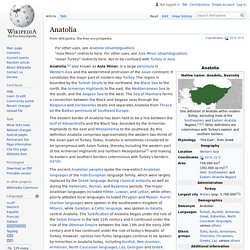
It makes up the majority of modern-day Turkey. Turkey. Country straddling Southeastern Europe and Western Asia Turkey (Turkish: Türkiye [ˈtyɾcije]), officially the Republic of Turkey (Turkish: Türkiye Cumhuriyeti [ˈtyɾcije dʒumˈhuːɾijeti] ( One of the world's earliest permanently settled regions, present-day Turkey was home to important Neolithic sites, and was inhabited by various civilisations, such as the ancient Anatolian peoples.[12][13][14] Hellenization started in the area during the era of Alexander the Great and continued into the Byzantine era.[13][15] The Seljuk Turks began migrating in the 11th century, and the Sultanate of Rum ruled Anatolia until the Mongol invasion in 1243, when it disintegrated into small Turkish principalities.[16] Beginning in the late 13th century, the Ottomans started uniting the principalities and conquering the Balkans, and the Turkification of Anatolia increased during the Ottoman period.
After Mehmed II conquered Constantinople in 1453, Ottoman expansion continued under Selim I. Etymology History Law. Candaules. Bibliographical record of Candaules, last Heraclid king of Libya Candaules (died c.687 BC; Greek: Κανδαύλης, Kandaulēs), also known as Myrsilos (Μυρσίλος),[1] was a king of the ancient Kingdom of Lydia in the early years of the 7th century BC. According to Herodotus, he succeeded his father Meles as the 22nd and last king of Lydia's Heraclid dynasty.
He was assassinated and succeeded by Gyges.[1][2] Based on an ambiguous line in the work of the Greek poet Hipponax, it was traditionally assumed that the name of Candaules meant "hound-choker" among the Lydians.[3] J. B. Gyges of Lydia. Biographical record of Gyges, king of Lydia, 7th century BC A rare depiction of the legend of Gyges finding the magic ring, Ferrara, 16th century Gyges (, ; Greek: Γύγης; Lydian: 𐤨𐤰𐤨𐤠𐤮 Kukaś; fl. 7th century BC) was the founder of the Mermnad dynasty of Lydian kings.
The dates of his reign are uncertain but have been tentatively estimated as c. 687 – c. 652 BC.[1] He was a bodyguard of his predecessor Candaules whom he assassinated in order to seize the throne. His action was approved by the Delphic Oracle and that decision prevented civil war in Lydia. Once established on the throne, Gyges devoted himself to consolidating his kingdom and making it a military power. Attestations and etymology[edit] Sadyattes. Sadyattes (reigned c.603–c.591 BC) was the third king of the Mermnad dynasty in Lydia, the son of Ardys. According to Herodotus, he reigned for twelve years.
He was succeeded by his son Alyattes. Sadyattes. Alyattes of Lydia. Croesus. Lydian King. Arion. Dolphin. Marine mammals, closely related to whales and porpoises Dolphin is a common name of aquatic mammals within the infraorder Cetacea. Solon. Solon (Greek: Σόλων Sólōn [só.lɔːn]; c. 630 – c. 560 BC)[1] was an Athenian statesman, lawmaker and poet. Tellus. Tellus is a Latin word meaning "Earth" and may refer to: Atys (son of Croesus) Adrastus. Pythia. Peisistratos. Sparta. The Babylonian Marriage Market. Anatolia. Cappadocia. Matiene. Phrygians. Paphlagonia. Eclipse of Thales. Thales.
Battle of Halys. Cyrus the Great. Medes. Deioces. Phraortes. Cyaxares. Astyages. Cyrus the Great. Astyages. Harpagus. Culture of Iran. Pactyes. Cyme. Assyria. Babylon. Massagetae.